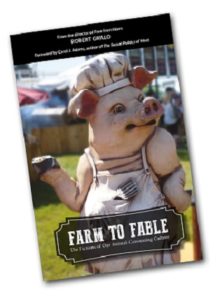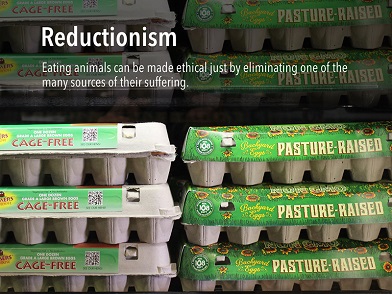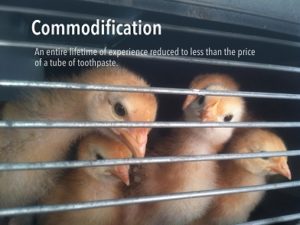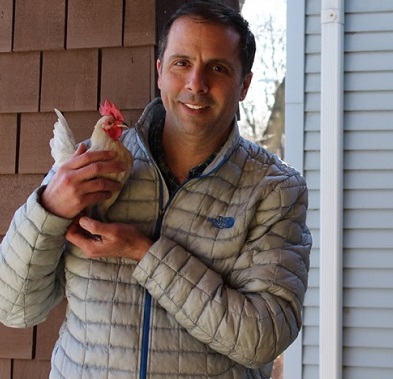In Farm to Fable, Robert Grillo Uncovers Dangerous Marketing Fantasies
Farm to Fable is an eye-opening book that answers the question: Why do people in modern societies eat animals, when it is not necessary for (in fact is harmful to) our health and survival? Author Robert Grillo shows that a series of manipulative fictions keep animals on our collective plates. His insider’s perspective as a marketing consultant (including former work on Happy Meal boxes) is the ideal basis for his careful research and insightful analysis. His book continues the powerful work on his extensive site Free From Harm.
I was happy to talk with Robert, and my most pressing question was how people who

Farm to Fable is a powerful book that uncovers, then demolishes, the many fictions that keep people eating animal foods
choose to eat meat react when the animal food industry fictions are so starkly exposed. He has gotten these feelings from his readers. “They’re taken by how many deeply entrenched fictions there are. The facts are stunning, and make them think of other ways society gets us to accept things that are otherwise deplorable. They are ready to get involved, and take steps to change their diet. For the general public, my hope is that the book will prompt them to question what appears to be “normal” in their everyday lives. I hope that they might better see how we are being manipulated to make food choices that ultimately betray our core values of kindness, reciprocity, and decency.”
Robert shared that the book is rooted in knowing that choices are tied to beliefs, and beliefs can be transformed by powerful truths. “We must first identify and expose the fictions of animal consumption to then disempower them. The change we want to see requires that we disempower theses fictions through a massive grassroots, public education campaign which in turn will disempower the animal exploitation industries.”
SHATTERING THE FANTASIES
Farm to Fable is articulate, carrying you along with the power of its insights. This is

The fictions that Robert talks about show up all over. Here’s a sign of a restaurant being built at the Portland airport. Note it touts a healthy, happy looking chicken, as if it’s a wonderful act to consume this bird
powerful, memorable writing, with Robert in complete mastery of both his subject and his words. There is no need for hype or manipulation, because the bare facts are enough. The book flows through deeply entrenched animal foods fantasies with gathering momentum and force.
For example, one of the several foundational fictions of the animal foods industry is consent. As Robert writes: “All too often, farmed animals are portrayed as willing participants in whatever we want to do to them. By portraying the relationship between farmer and the animals he exploits as consensual, we, as consumers of his products, are misled into believing that other animals don’t mind being used against their will, thereby reducing the issue to one of how we treat them.”
The idea that some sort of human superiority to animals makes it okay to kill and eat them is another foundational fiction. As Robert powerfully observes in the book: “We act on this sense of superiority at every opportunity. The notion that human interests “trump” animal interests when we create an imaginary conflict of interest is particularly delusional when one considers that we wantonly kill sixty billion land animals and kill another trillion or so aquatic animals every year, not to protect any

Robert shows that this kind of reductionism is closely tied to humane-washing: an attempt to make consumers believe that all is okay because maybe one out of a thousand wrongs has been addressed to some tiny degree
important human interest but just to suit our pleasure in eating them.”
After demolishing a number of other foundational fictions, Farm to Fable covers other key issues in the animal foods industries. One of the most important of these is humane-washing, as Robert shows that feel-good labels such as “free-range” and “cage-free” have little meaning, and in no way make animal foods kind or justifiable.
Robert asserts that being vegan is not a state of purity. In fact, it’s so easy to be plant-based with the convenient options in stores, that a choice to be vegan consists of reaching for different products on store shelves. Not too difficult. As he observes toward the end of his book: “Veganism is far from perfection. Being vegan is a huge step in the right direction with very little effort proportionate to its immensely positive impact, but it’s actually not the most we can do for animals and the planet. It is the least we can do.”

Turning animals into things – mere commodities – is one of the pervasive fictions that industry uses to get you to buy what they are selling
If you care about animals and the truth about your food, Farm to Fable is a must-read book. Its countless insights into the indefensibility of the tactics that keep you eating meat will free you to make choices that are healthier for you, and will end suffering for billions of farmed animals. If you are already on a plant-based diet, Farm to Fable will strengthen your motivation and give you excellent insights to use in talking with others.
If you enjoyed this article, you may want to read my 2012 interview with Robert Grillo on why he adopted a vegan diet and became a farmed animal rescuer and defender.
Intrigued? Now you can use our Whole Foods Blog Finder to target informative, fun postings on whole foods, plant-based diets. Quick information at no cost!
Post written by Janice Stanger, Ph.D. Janice authored The Perfect Formula Diet: How to Lose Weight and Get Healthy Now With Six Kinds of Whole Foods. This book outlines a whole foods, plant-based diet with every nutrient you need to be healthy without animal foods.
Tags: Farm to Fable, Robert Grillo, vegan





